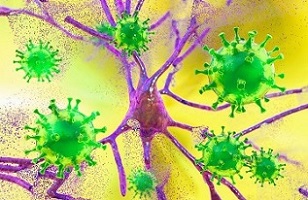BREAKING! COVID-19 News: Scientists From Brazil Discover That The SARS-CoV-2 Spike Protein Alters Microglial Purinergic Signaling! Variety Of Implications!
COVID-19 News - SARS-CoV-2 - Microglial Purinergic Signaling Mar 24, 2023 2 years, 11 months, 23 hours, 57 minutes ago
COVID-19 News: Researchers from Universidade Federal do Rio de Janeiro-Brazil have in a new study discovered that SARS-CoV-2 spike protein alters microglial purinergic signaling! The study findings have numerous worrisome implications in terms of the long-term health and medical issues that many Post COVID individuals will ultimately develop.

Despite long-term sequelae of COVID-19 emerging as a substantial public health concern, the mechanism underlying these processes still unclear. Numerous
COVID-19 News coverages have already covered about the various Long COVID-19 and Post COVID health and medical manifestations.
Current evidence demonstrates that SARS-CoV-2 Spike protein can reach different brain regions, irrespective of viral brain replication resulting in activation of pattern recognition receptors (PRRs) and neuroinflammation.
The study team taking into consideration that Consideration that microglia dysfunction, which is regulated by a whole array of purinergic receptors, may be a central event in COVID-19 neuropathology, decided to investigate the impact of SARS-CoV-2 Spike protein on microglial purinergic signaling.
The study team demonstrate that cultured microglial cells (BV2 line) exposed to Spike protein induce ATP secretion and upregulation of P2Y6, P2Y12, NTPDase2, and NTPDase3 transcripts.
Furthermore, detailed immunocytochemistry analysis showed that spike protein increases the expression of P2X7, P2Y1, P2Y6, and P2Y12 in BV2 cells.
Additional, hippocampal tissue of Spike infused animals (6,5ug/site, i.c.v.) presents increased mRNA levels of P2X7, P2Y1, P2Y6, P2Y12, NTPDase1, and NTPDase2.
Subsequent immunohistochemistry experiments confirmed high expression of the P2X7 receptor in microglial cells in CA3/DG hippocampal regions after spike infusion.
The study findings suggest that SARS-CoV-2 Spike protein modulates microglial purinergic signaling and opens new avenues for investigating the potential of purinergic receptors to mitigate COVID-19 consequences.
The study findings were published as an abstract in the peer reviewed journal: Frontiers in Immunology. A detailed version of the study is expected to be published in coming weeks.
https://www.frontiersin.org/articles/10.3389/fimmu.2023.1158460/abstract
The microglia are the main resident immune-competent cell type of the central nervous system (CNS); these cells are highly sensitive to subtle changes in the chemical environment of the brain.
Microglia are activated during diverse conditions, such as apoptosis, trauma, inflammation, and infection. The specific activities of microglia result from the confluence of environmental stimuli and the cellular state. It is likely that several signaling systems with different biological functions operate in competition and/or synergy, thus regulating similar microglial behaviors.
The purinergic system is one of the fundamental signaling systems that establish microglial behavior
in a wide spectrum of conditions. Adenosine tri-phosphate (ATP) belongs to the purinergic signaling system, which includes P2X, P2Y, and P1 receptors, as well as other proteins participating in ATP secretion and extracellular ATP degradation, and molecules that recognize purines as a ligand.
In neurodegenerative illnesses, they aggravate the original disease by a microglia-based compulsory neuroinflammatory reaction. Therefore, the blockade of this reaction improves the outcome of Alzheimer’s Disease, Parkinson’s Disease, multiple sclerosis, amyotrophic lateral sclerosis, etc. The function of microglia is regulated by a whole array of purinergic receptors classified as P2Y12, P2Y6, P2Y4, P2X4, P2X7, A2A, and A3, as targets of endogenous ATP, ADP, or adenosine. ATP is sequentially degraded by the ecto-nucleotidases and 5′-nucleotidase enzymes to the almost inactive inosine as an end product. The appropriate selective agonists/antagonists for purinergic receptors as well as the respective enzyme inhibitors may profoundly interfere with microglial functions and reconstitute the homeostasis of the CNS disturbed by neuroinflammation.
Importantly, alterations in microglial purinergic signaling can lead to various neurological and neurodegenerative disorders. Microglia are the primary immune cells in the central nervous system (CNS) and play a crucial role in maintaining the brain's homeostasis.
Purinergic signaling involves the extracellular release and detection of purines (such as ATP) and pyrimidines, which act as signaling molecules to modulate various cellular functions, including microglial activation and communication with other cells.
Some consequences of altered microglial purinergic signaling include:
-
Neuroinflammation: Dysregulation of purinergic signaling can cause excessive microglial activation and pro-inflammatory cytokine release, contributing to neuroinflammation, which is associated with several neurodegenerative diseases, such as Alzheimer's disease, Parkinson's disease, and multiple sclerosis.
Impaired synaptic function: Altered purinergic signaling may affect microglial modulation of synaptic function and plasticity, leading to cognitive decline and memory impairment, which are common features of various neurological disorders.
-
Neurotoxicity: Imbalances in purinergic signaling can cause microglia to release neurotoxic molecules, resulting in neuronal damage and dysfunction, contributing to the progression of neurodegenerative diseases.
-
Impaired phagocytosis: Dysregulated purinergic signaling can affect the ability of microglia to perform phagocytosis, which is essential for the clearance of debris, apoptotic cells, and aggregated proteins like amyloid-beta in Alzheimer's disease.
-
Autoimmune disorders: Alterations in purinergic signaling may contribute to the development of autoimmune disorders such as multiple sclerosis, where the immune system attacks the protective myelin sheath surrounding nerve fibers.
Conclusion:
Given the involvement of altered microglial purinergic signaling in various neurological disorders, the study findings that SARS-CoV-2 alters the microglial purinergic signaling pathway has numerous implications in Post-COVID and Long COVID manifestations.
Targeting the purinergic pathways is a potential strategy to treat certain Post COVID and Long COVID issues, however, further research is needed to understand the precise mechanisms and ways develop effective treatments.
For the latest
COVID News, keep on logging to Thailand Medical News.
